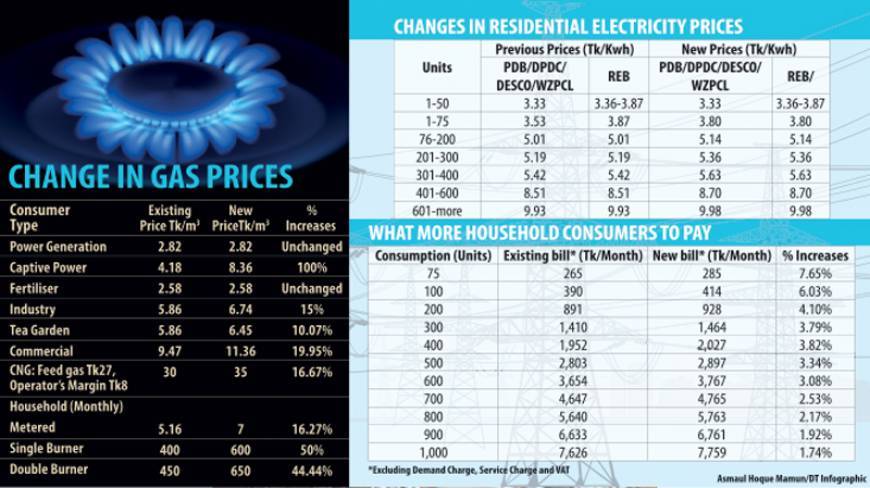Starting September 1, home users will have to pay Tk200 more for using single and double gas burners and Tk0.18 more for using every unit of electricity.
The Bangladesh Energy Regulatory Commission (BERC) yesterday announced that the monthly bill for single gas burners will be Tk600 – instead of the current Tk400 – and that of double burners Tk650 – instead of Tk450. Thus, the average price hike for this utility stands at 26.29%.
Currently, each unit of electricity costs a retail user Tk6.15. From next month, this will be Tk6.33, which means this tariff will see a 2.93% raise. However, those domestic users who consume between 1-50 units per month – the “lifeline tariff” slab – will continue to pay the old prices.
The BERC yesterday also announced a Tk0.23 or 4.93% higher tariff per unit for bulk consumption of electricity, propelled by a 0.05% rise in transmission charges. This means that the wholesale price of every unit of electricity will rise from Tk4.67 to Tk4.90.
There was a proposal for increasing the gas transmission charges as well but the regulator dropped that.
These price hike announcements – made by the energy regulator at a press conference in Dhaka yesterday – follow separate public hearings on gas and power price hike proposals earlier this year.
At present, there are 10 consumer groups seven slabs for domestic consumers. The BERC has not increased the minimum bills and service, demand and delay charges.
However, domestic consumers who fall in the lower usage slabs will have to pay higher rates compared to those who belong to the higher usage slabs.
The regulator has hiked retail power tariffs – in the Tk3.83-Tk11.98 range – for the other slabs as well which apply to small industries, non-residential and commercial offices, medium voltage (11kV general use), extra high voltage (132kV general use), high tension (33kV general use), street lights and water.
The five power distributors – Power Development Board (PDB), Rural Electrification Board (REB), Dhaka Electricity Supply Company (Desco), Dhaka Power Distribution Company (DPDC) and the West Zone Power Distribution Company – supply electricity to around 20 million consumers across the country.
The six companies that distribute gas across the country are Titas Gas Transmission and Distribution Company Ltd, Pashchimanchal Gas Company Limited, Bakhrabad Gas Distribution Company Limited, Karnaphuli Gas Distribution Company Limited, Jalalabad Gas Transmission and Distribution System Limited and Sundarban Gas Company Limited.
At yesterday’s press conference BERC Chairman AR Khan said that the commission had made its decision after careful consideration of the interests of all consumers.
While fixing the new tariff for bulk power consumption, they kept in mind the impact that the hikes were going to have on people from different walks of life and organisations. The retail prices were changed on the basis of the change in bulk price, he said.
However, despite the hike, the government will still have to pay as much as Tk4,300 crore in subsidy to cover up PDB’s losses this year, he added.
Regarding the hike in gas prices, the BERC Chairman said: “The authorities kept in mind that the demand for gas is increasing but reserve has been declining. The price of gas was hiked in order to ensure energy security and adjust the costs of production, transmission and distribution.”
He also said: “The country has never calculated the asset value of natural gas before. The new retail price of gas was fixed in line with a government move to fix the value of natural gas at Tk25 per Mcf [1,000 cubit feet].”
However, the commission is unlikely to increase retail-level power and gas tariffs as long as the companies are making profit, said Shamsul Alam, energy adviser to the Consumers Association of Bangladesh.
In immediate reaction, Zakir Hossain Nayan, leader of the Bangladesh CNG Station and Conversion Workshop Owners Association, said raising the price of CNG (converted natural gas) will only benefit the officials of the gas distribution companies who are already overpaid and draw huge amount of bonus from the profit that these companies make.
Energy expert Prof Ijaz Hossain said the gas price hike is logical because it had been kept unchanged for seven years, but the government’s excessive dependence on fuel-oil-based power plants will only
end up putting upward pressure on electricity prices.
“The higher price of electricity will push up the cost of living, create instability in the market and at the same time narrow down people’s access to power,” said Prof Ijaz, who teaches chemical engineering at Buet.
As per current plans, when the government imports liquefied natural gas (LNG) in the future, even this new price of gas may prove to be detrimental for the market mechanisms, Ijaz said.
Source: Dhaka Tribune


